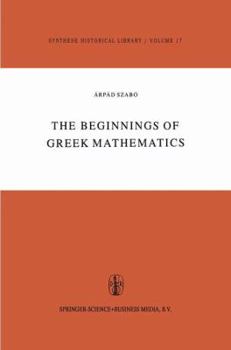The Beginnings of Greek Mathematics
When this book was first published, more than five years ago, I added an appendix on How the Pythagoreans discovered Proposition 11.5 of the 'Elements'. I hoped that this appendix, although different in some ways from the rest of the book, would serve to illustrate the kind of research which needs to be undertaken, if we are to acquire a new understanding of the historical development of Greek mathematics. It should perhaps be mentioned that this book is not intended to be an introduction to Greek mathematics for the general reader; its aim is to bring the problems associated with the early history of deductive science to the attention of classical scholars, and historians and philos- ophers of science. I should like to conclude by thanking my translator, Mr. A. M. Ungar, who worked hard to produce something more than a mechanical translation. Much of his work was carried out during the year which I spent at Stanford as a fellow of the Center for Advanced Study in the Behavioral Sciences. This enabled me to supervise the work of transla- tion as it progressed. I am happy to express my gratitude to the Center for providing me with this opportunity. Arpad Szabo NOTE ON REFERENCES The following books are frequently referred to in the notes. Unless otherwise stated, the editions are those given below. Burkert, W. Weisheit und Wissensclzaft, Studien zu Pythagoras, Philo- laos und Platon, Nuremberg 1962.
Format:Hardcover
Language:English
ISBN:9027708193
ISBN13:9789027708199
Release Date:November 1978
Publisher:Springer
Length:358 Pages
Weight:1.50 lbs.
Dimensions:0.9" x 6.1" x 9.2"
Customer Reviews
0 rating





